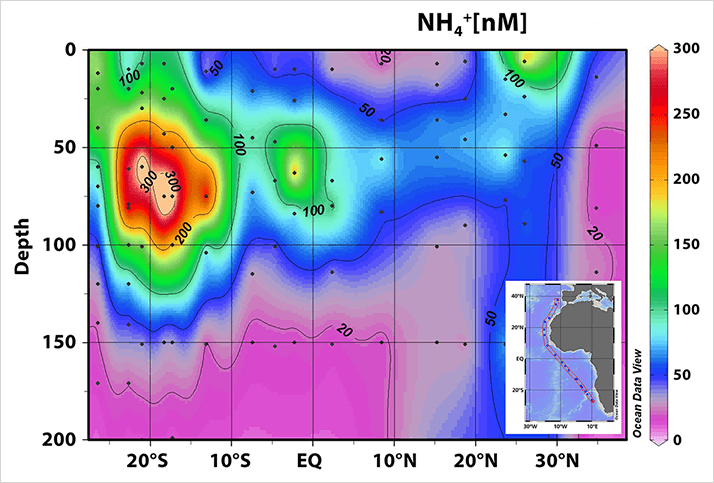Tiny Algae, Big Impact
Marine phytoplankton are an important part of the carbon cycle, converting CO2 to organic matter via photosynthesis in a process known as carbon fixation. When phytoplankton die, they sink into the ocean as biomass, becoming food for heterotrophic bacteria or settling on the sea floor. Carbon fixation by the oceans helps to balance production of atmospheric CO2, so an understanding of the dynamics involved is vital to predicting climate change.

A Sensitive Expedition
A research team from Vrije Universiteit Brussel (Brussels, Belgium) voyaged from Bremerhaven, Germany, to Cape Town, South Africa, in 2012 to study phytoplankton production. They sampled water from several depths, added nutrients spiked with 13C and 15N isotopes, and then measured how much was consumed by the phytoplankton. In order to add the right concentration of nutrients, they first needed to measure how much was naturally present. In the case of ammonium (NH4+), colorimetric techniques are not sensitive enough to measure the nanomolar levels present in nutrient-deficient waters, so a new technique was needed.A fluorescence assay was the answer. Ammonium reacts with orthophthaldialdehyde to fluoresce, and the intensity can be correlated to NH4+ concentration. By combining our Torus spectrometer, an LED source for excitation and 4-way cuvette holder, the team created a system lightweight and robust enough for use at sea. The system showed excellent sensitivity and linearity, measuring NH4+concentrations as low as 10 nmol/L. Values obtained were then used to determine the amount of 15N-ammonium needed for the nutrient uptake experiments.
 Figure 1: NH4+ concentration in seawater as a function of depth and latitude (inset shows voyage route).
Figure 1: NH4+ concentration in seawater as a function of depth and latitude (inset shows voyage route).Destination: Cape Town
This fluorescence system was put to the test at regular intervals from 35° N to 27° S latitude en route to Cape Town, crossing several climate zones. When mapped as a function of depth and latitude around the equator, the NH4+ levels measured were found to range from 20 nmol/L to 300 nmol/L. Results of the subsequent nutrient uptake experiments were used to study how latitudinal trends in temperature, currents, light, dust deposition and other variables influence the use of different nutrients by phytoplankton.
Back at Sea
Since the 2012 expedition, the team has used the same system on other voyages, studying east Antarctic pack ice as well as the Azores Current area in the North Atlantic. Impressed with the performance of the Ocean Optics system, the team has added colorimetric methods to assist with nitrate measurements, in which orthophosphate and silicic acid content are determined via absorbance using a 10 cm path flowcell. As we better understand the characteristics of the ecosystem that impact the capacity of phytoplankton to uptake and fix CO2, we better understand our future.
>> Download the full Application Note as PDF
Contact Information
Email:Info@OceanOptics.com





